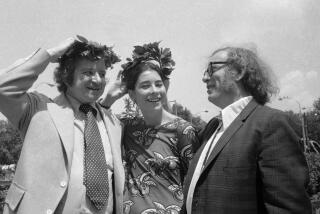Evan S. Connell Jr. dies at 88; iconoclastic novelist, historian
Evan S. Connell Jr., a literary iconoclast whose writings as a novelist, poet, essayist and historian won the admiration of critics and a cult-like following of discerning readers with books on subjects as eclectic as Midwestern provincialism, the medieval Crusades and Gen. George Custer’s last stand, has died. He was 88.
Connell, who had been in failing health in recent years, was found dead Thursday at his home in Santa Fe, N.M. The cause “was just old age,” said his niece, Donna Waller.
Called “one of our most interesting and intelligent American writers” by novelist and critic Joyce Carol Oates, Connell wrote the bestselling novels “Mrs. Bridge” (1959) and “Mr. Bridge” (1969), whose protagonists were portrayed by Joanne Woodward and Paul Newman in the 1990 movie “Mr. and Mrs. Bridge.”
Connell was also known for his nonfiction, which ranged across continents and centuries, examining historical moments like Custer’s ignominious defeat in the 19th century Indian Wars in “Son of the Morning Star: Custer and the Little Bighorn” (1984). That book was a surprise bestseller, adapted for a television miniseries, and a finalist for the National Book Critics Circle prize.
The novels and Custer book were among the most accessible of his works, which also included “The Alchymist’s Journal” (1991), the imagined diaries of seven pre-Renaissance alchemists, and “The Aztec Treasure House” (2001), a collection of vividly detailed essays about alchemists, astronomers and explorers.
His last book was the short story collection “Lost in Uttar Pradesh” (2008), which Los Angeles Times book critic David Ulin called “a vivid metaphor” for a career that was at times brilliant, frustrating and mysterious.
Making his debut as a novelist in the same time period as Philip Roth and John Updike, Connell earned comparisons to those writers with “Mrs. Bridge,” the story of a lonely and conventional Kansas City, Mo., housewife whose material wealth conceals a life of quiet desperation. Wallace Stegner pronounced it “a hell of a portrait.”
Like much of his other fiction, it was semi-autobiographical, set in Connell’s hometown. Born in Kansas City on Aug. 17, 1924, Connell was the son and grandson of physicians. He was a pre-med student at Dartmouth, which he attended from 1941 to 1943, but ultimately decided against following in his elders’ footsteps. This did not please his father, whom Connell described as “a rather severe man.”
“He was concerned that I would never be able to make a living at this kind of thing,” Connell, in a 2000 interview with the Associated Press, said of writing. “It was a justifiable concern, I think. I grew up in a home where there was no music, no interest in any of the arts.”
He dropped out of Dartmouth and joined the Navy, training as an aviator at a base near Albuquerque, where he fell in love with the vastness of the West. After completing his military service, he studied painting on the GI Bill and traveled, living in France during the 1950s and writing for the Paris Review.
He moved to San Francisco in 1954, and three years later Viking published his first book, “The Anatomy Lesson and Other Stories.”
He initially wrote “Mrs. Bridge” rather conventionally, with about 15 chapters, but it was rejected by numerous publishers in part because it lacked a climax. That was his intention, Connell said, because “our lives do not reach a dramatic climax in the way that books usually do. Most of us just go on day to day through major and minor trials and defeats. And finally time runs out.”
He restructured the novel as a series of 117 vignettes, which paint a devastating portrait of a woman puzzled by the emptiness of the small world she inhabits. The novel was “one of the very few written since World War II that clearly deserves to be called, as it has been, a masterpiece,” William H. Nolte wrote in the Dictionary of Literary Biography.
Connell followed the same theme and structure a decade later in the companion novel, “Mr. Bridge.” Some critics found it darker and more satirical than the first novel because the main character, Mrs. Bridge’s joyless lawyer husband, was far less likable than his wife.
Despite the success of the “Bridge” novels, Connell held a number of odd jobs to get by. He delivered mail, read gas meters and was a counselor at an unemployment office. In his exceedingly dark 1966 novel “The Diary of a Rapist,” the main character is working in an unemployment office when he goes crazy.
“He always wrote about what he was interested in,” his niece said, “not what would make money.”
In 1984, three years after he told Publishers Weekly that he was “just barely” able to support himself, his novelistic book on Custer was released to wide acclaim and some controversy for its unflattering portrayal of the general as a man who hungered for fame and was rendered sterile by gonorrhea.
Larry McMurtry, in a 2008 appraisal of Custer scholarship for the New York Review of Books, said Connell’s work was “one of the few masterpieces to concern itself with the American West” and particularly noteworthy for its descriptions of the character of the Native Americans.
Unlike Custer, Connell shied from publicity. He did not give readings or teach college courses, hated crowds and was loath to be photographed. He did not own a phone until he was 50 and took his television out of the closet only for football games.
A lover of women who never married, he was “a very shy man who lives inside himself … inside his own mind,” actress and singer Gale Garnett, a longtime friend and former girlfriend, told The Times in 1991.
He won a number of honors for lifetime achievement, including the $100,000 Lannan Literary Award in 2000 and a Los Angeles Times Book Prize in 2010.
“We believe he’s one of the most important postwar American writers,” Patrick Lannan of the Lannan Foundation told the Associated Press in 2000. “To be that good in fiction, nonfiction and poetry is really … remarkable.”
Connell, who left San Francisco for Santa Fe in 1989, is survived by a sister, Barbara Zimmermann, of Houston; a nephew; and two nieces.
More to Read
Start your day right
Sign up for Essential California for the L.A. Times biggest news, features and recommendations in your inbox six days a week.
You may occasionally receive promotional content from the Los Angeles Times.







